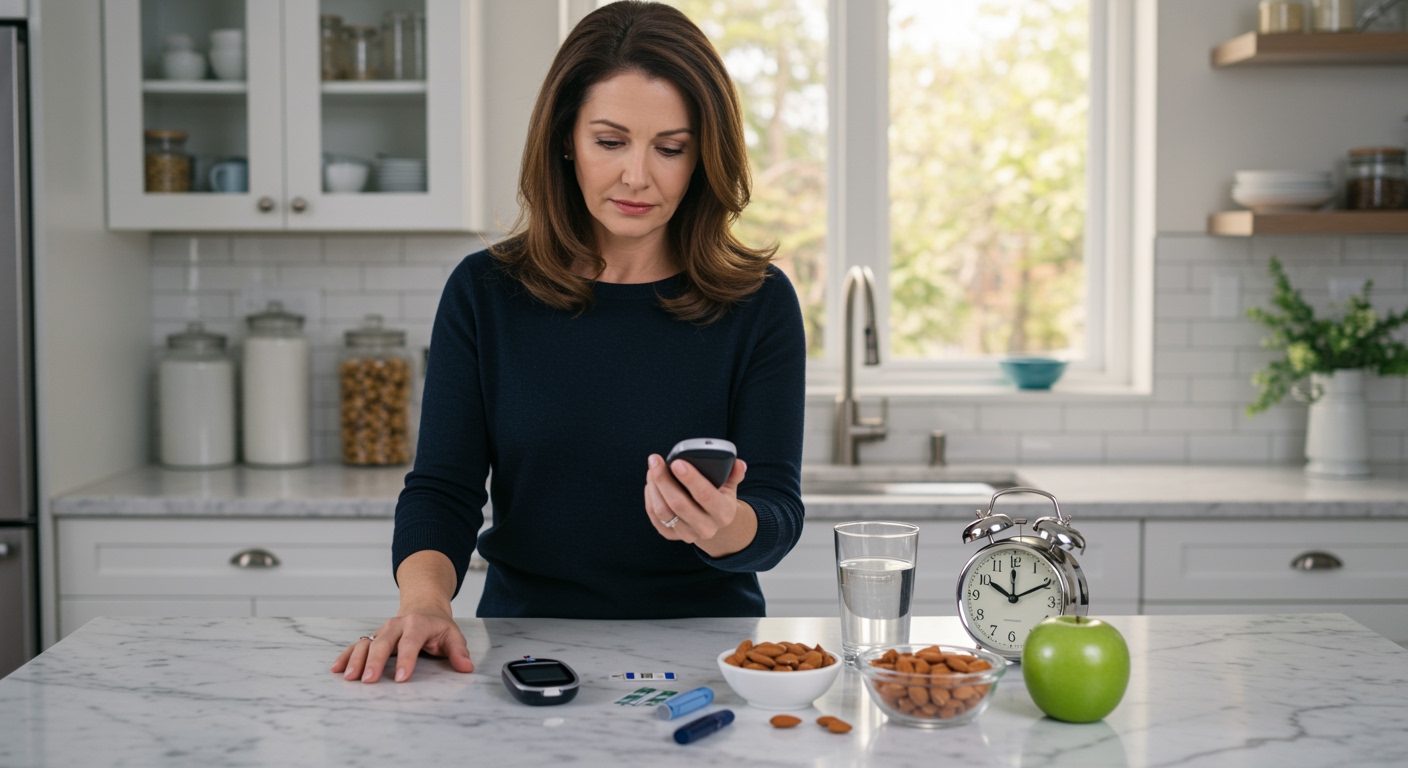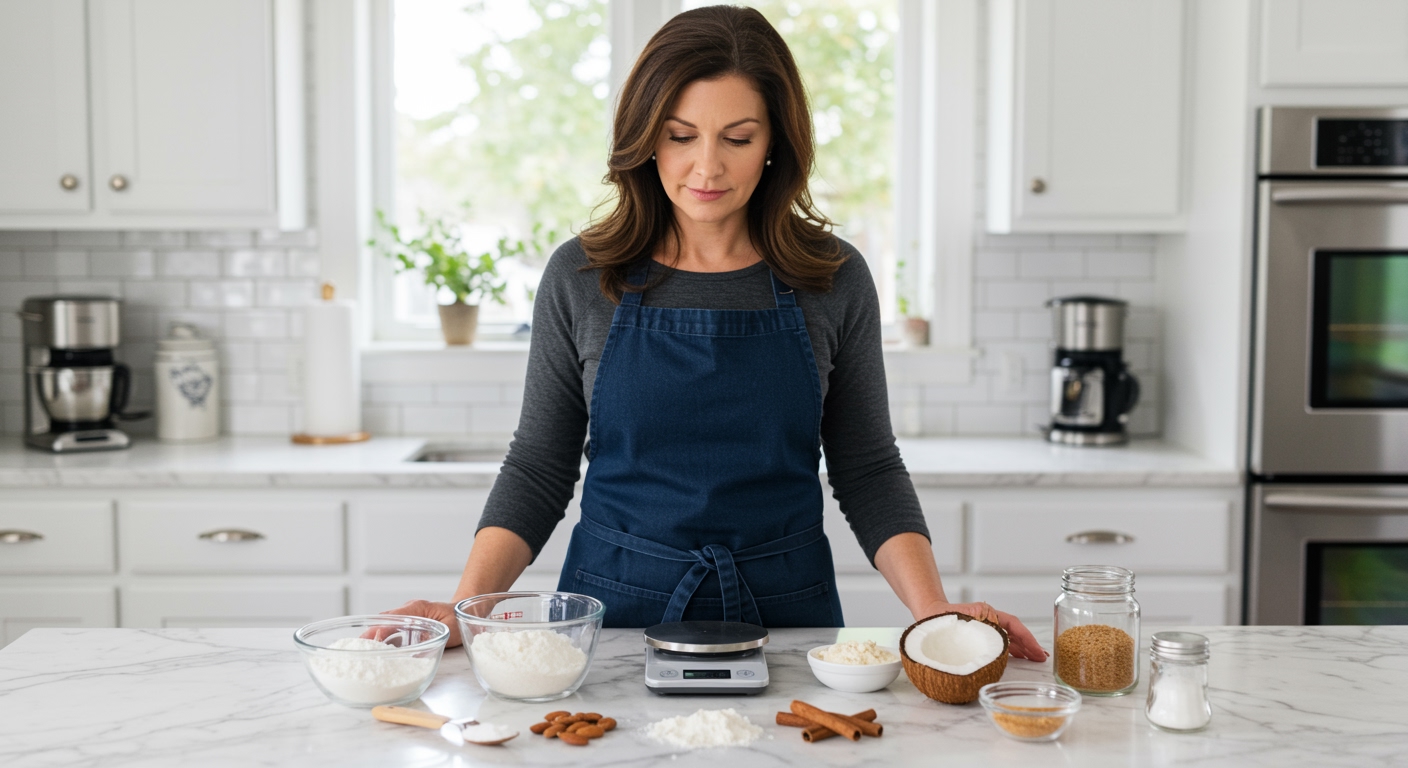✪ Key Takeaway: PCOS can cause sudden blood sugar crashes through insulin resistance that triggers reactive hypoglycemia after meals.
Introduction
You feel fine after lunch, then suddenly your energy crashes and you desperately crave something sweet.
Many women with PCOS experience these mysterious blood sugar drops that leave them shaky, tired, and reaching for the nearest candy bar.
Hi, I am Abdur, your nutrition coach and today I am going to explain how PCOS creates these dangerous blood sugar crashes and what you can do to stop them.
How Does PCOS Affect Your Blood Sugar Control?
PCOS disrupts your body’s insulin sensitivity in ways that create a roller coaster effect with your blood sugar.
When you have insulin resistance, your cells do not respond properly to insulin signals.
Your pancreas compensates by producing extra insulin to force glucose into your cells.
This excess insulin often overshoots the mark and drives your blood sugar too low.
The result is reactive hypoglycemia that occurs 2-4 hours after eating.
Your body then triggers intense cravings for quick sugar to bring levels back up.
This creates a vicious cycle of blood sugar spikes followed by crashes that leaves you exhausted.
✪ Fact: Up to 70% of women with PCOS have some degree of insulin resistance that can trigger blood sugar crashes.
What Triggers These Sudden Blood Sugar Drops?
Certain foods and eating patterns make PCOS-related blood sugar crashes much more likely to occur.
Refined carbohydrates like white bread, pasta, and sugary snacks cause rapid blood sugar spikes.
Your already overworked pancreas responds by flooding your system with insulin.
This insulin surge often drives blood sugar below normal levels within a few hours.
Skipping meals or going too long without eating also triggers hypoglycemic episodes.
Stress hormones like cortisol can worsen insulin resistance and make crashes more severe.
Even artificial sweeteners can trigger insulin responses in some women with PCOS.
✪ Pro Tip: Keep a food and symptom diary to identify your personal blood sugar crash triggers.
What Are The Warning Signs Of A Blood Sugar Crash?
Your body sends clear signals when blood sugar drops too low, but many women ignore these early warnings.
Shakiness and trembling hands are often the first signs of dropping glucose levels.
You might feel suddenly anxious, irritable, or have trouble concentrating.
Physical symptoms include rapid heartbeat, sweating, and feeling lightheaded or dizzy.
Intense cravings for sweet or starchy foods signal your body’s desperate attempt to raise blood sugar.
Some women experience blurred vision or feel confused during severe drops.
Recognizing these symptoms early allows you to take action before the crash becomes dangerous.
✪ Note: Severe hypoglycemia can cause fainting or seizures, so never ignore multiple warning signs occurring together.
How Can You Prevent PCOS Blood Sugar Crashes?
Preventing blood sugar crashes requires strategic eating patterns that work with your insulin resistance, not against it.
Eat balanced meals every 3-4 hours that combine protein, healthy fats, and complex carbohydrates.
Protein helps slow glucose absorption and prevents rapid blood sugar spikes.
Choose low glycemic foods like vegetables, legumes, and whole grains over refined options.
Never skip breakfast, as this sets you up for blood sugar instability throughout the day.
Keep healthy snacks like nuts, seeds, or apple slices with almond butter readily available.
Regular exercise improves insulin sensitivity and helps stabilize blood sugar levels long-term.
✪ Pro Tip: Cinnamon and chromium supplements may help improve insulin sensitivity in women with PCOS.
When Should You Seek Medical Help?
While occasional mild blood sugar dips are manageable, frequent or severe crashes require professional medical attention.
See your doctor if you experience multiple crashes per week despite dietary changes.
Blood sugar drops below 70 mg/dL are considered medically significant hypoglycemia.
Symptoms that interfere with daily activities or work performance need immediate evaluation.
Your healthcare provider can test for diabetes or other metabolic disorders beyond PCOS.
Medications like metformin might help improve insulin sensitivity and reduce crash frequency.
A continuous glucose monitor can provide valuable data about your blood sugar patterns throughout the day.
✪ Note: Emergency medical care is needed if you lose consciousness or cannot treat a low blood sugar episode yourself.
The Bottom Line
PCOS can absolutely cause sudden blood sugar crashes through insulin resistance that triggers reactive hypoglycemia after meals.
Your body is not broken, it just needs the right fuel at the right times to function properly.
I would love to hear about your experiences with blood sugar crashes and what strategies have worked best for you in the comments below.
References
At NutritionCrown, we use quality and credible sources to ensure our content is accurate and trustworthy. Below are the sources referenced in creating this article:
- PCOS Weight Loss: PCOS and Hypoglycemia
- Fertility Family: PCOS Insulin Resistance
- Cedars-Sinai: PCOS Diabetes Heart Disease Stroke
- The PCOS Nutritionist: Insulin Resistance and PCOS Guide
- Nutrisense: PCOS and Blood Glucose Levels





